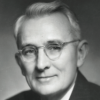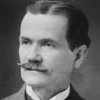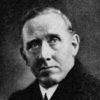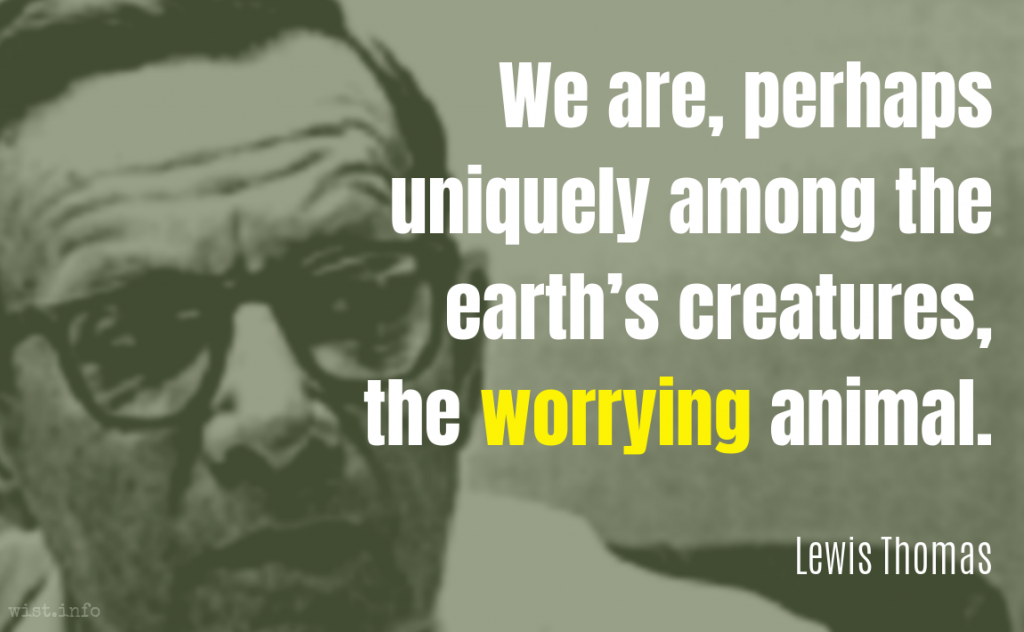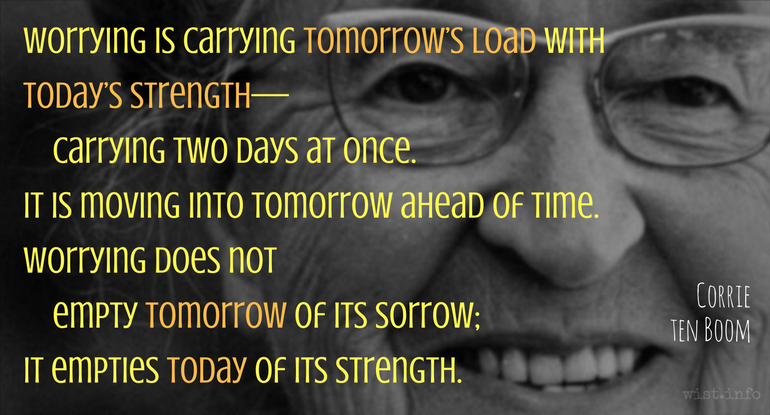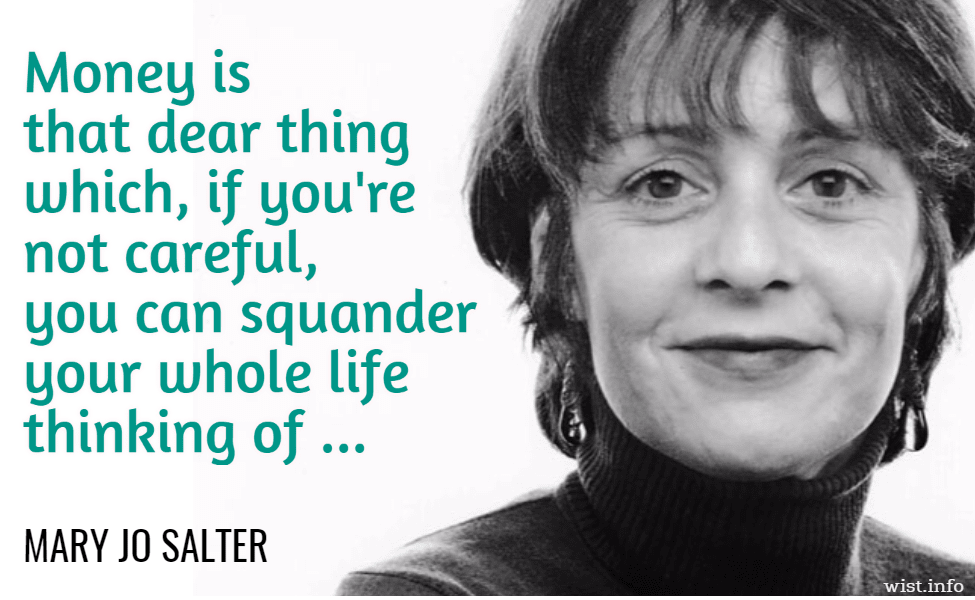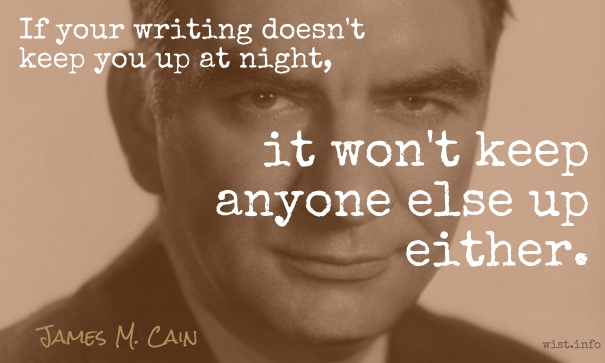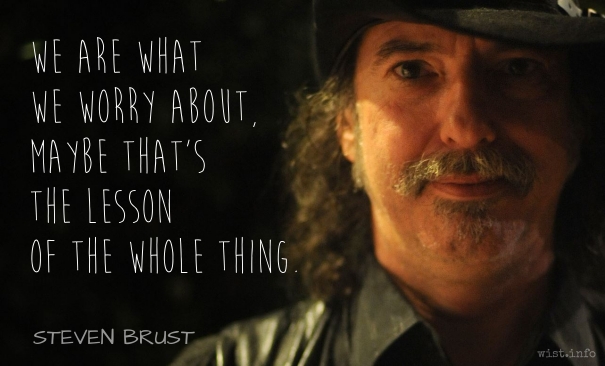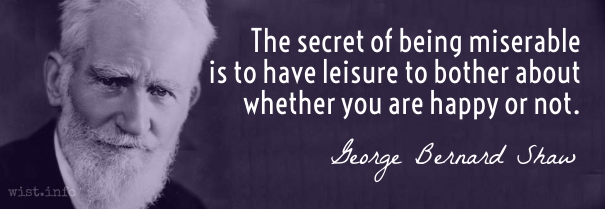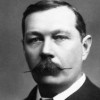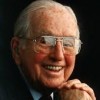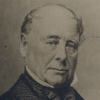Remember, today is the tomorrow you worried about yesterday.
Dale Carnegie (1888-1955) American writer, lecturer
How to Stop Worrying and Start Living, Part 10 “How I Conquered Worry” (1948)
(Source)
Final note by Carnegie on the story "Six Major troubles Hit Me All At Once" by C. I. Blackwood of Oklahoma City.
The phrase was a "rule" Carnegie taught in his adult courses, and he collected many reports from students about how the various rules taught in the course actually worked in their lives. Thus the "remember" above and how the phrase is also mentioned, quoted in the past tense, in the story "I Now Look for the Green Light," by Joseph M. Cotter of Chicago: "I was told over and over that 'today was the tomorrow I had worried about yesterday.'"
Quotations about:
worry
Note not all quotations have been tagged, so Search may find additional quotes on this topic.
One of the things that militates against happiness is worry, and that’s one respect in which I’ve become much happier as I’ve grown older. I worry much less and I found a very useful plan in regard to worry, which is to think, “Now what is the very worst thing that could happen?” And then think, “Well, after all it wouldn’t be so very bad a hundred years hence; it probably won`t matter.” After you’ve really made yourself think that, you won`t worry so much. Worry comes from not facing unpleasant possibilities.
Bertrand Russell (1872-1970) English mathematician and philosopher
Interview by Woodrow Wyatt, BBC TV (1959)
Collected in Bertrand Russell's BBC Interviews (1959) [UK] and Bertrand Russell Speaks His Mind (1960) [US]. Reprinted (abridged) in The Humanist (1982-11/12), and in Russell Society News, #37 (1983-02).
Care to our coffin adds a nail, no doubt;
And every grin, so merry, draws one out.John Wolcot (1738-1819) English satirist (pseud. Peter Pindar)
Expostulatory Odes to a Great Duke and a Little Lord, Ode 15, ll. 5-6 (1789)
(Source)
But the rich man is tortured by fears, wasted with griefs, aflame with greed, never free from care, always restless and uneasy, out of breath from unending struggles with his enemies. It is true enough that he increases his holdings beyond measure by going through these miseries; but at the same time, thanks to that very increase, he also multiples his bitter cares. In contrast, the individual of moderate means is satisfied with his small and limited property; he is loved by family and friends; he enjoys sweet peace with his relations, neighbors, and friends; he is devout in his piety, benevolent of mind, sound of body, moderate in his style of life, unblemished in character, and untroubled in conscience. I do not know whether anyone would be so foolish as to have any doubt about which of the two to prefer.
[Alium praediuitem cogitemus; sed diuitem timoribus anxium, maeroribus tabescentem, cupiditate flagrantem, numquam securum, semper inquietum, perpetuis inimicitiarum contentionibus anhelantem, augentem sane his miseriis patrimonium suum in inmensum modum atque illis augmentis curas quoque amarissimas aggerantem; mediocrem uero illum re familiari parua atque succincta sibi sufficientem, carissimum suis, cum cognatis uicinis amicis dulcissima pace gaudentem, pietate religiosum, benignum mente, sanum corpore, uita parcum, moribus castum, conscientia securum. Nescio utrum quisquam ita desipiat, ut audeat dubitare quem praeferat.]
Augustine of Hippo (354-430) Christian church father, philosopher, saint [b. Aurelius Augustinus]
City of God [De Civitate Dei], Book 4, ch. 3 (4.3) (AD 412-416) [tr. Babcock (2012)]
(Source)
On wealth and power as the foundation for happiness.
(Source (Latin)). Alternate translations:
Let my wealthy man take with him fears, sorrows, covetousness, suspicion, disquiet, contentions, making immense additions to his estate only by adding to his heap of most bitter cares; and let my poor man take with him sufficiency with little, love of kindred, neighbours, friends, joyous peace, peaceful religion, soundness of body, sincereness of heart, abstinence of diet, chastity of carriage, and security of conscience. Where should a man find any one so sottish as would make a doubt which of these to prefer in his choice?
[tr. Healey (1610)]
But the rich man is anxious with fears, pining with discontent, burning with covetousness, never secure, always uneasy, panting from the perpetual strife of his enemies, adding to his patrimony indeed by these miseries to an immense degree, and by these additions also heaping up most bitter cares. But that other man of moderate wealth is contented with a small and compact estate, most dear to his own family, enjoying the sweetest peace with his kindred neighbors and friends, in piety religious, benignant in mind, healthy in body, in life frugal, in manners chaste, in conscience secure. I know not whether any one can be such a fool, that he dare hesitate which to prefer.
[ed. Dods (1871)]
But, our wealthy man is haunted by fear, heavy with cares, feverish with greed, never secure, always restless, breathless from endless quarrels with his enemies. By these miseries, he adds to his possessions beyond measure, but he also piles up for himself a mountain of distressing worries. The man of modest means is content with a small and compact patrimony. He is loved by his own, enjoys the sweetness of peace, in his relations with kindred, neighbors, and friends, is religious and pious, of kindly disposition, healthy in body, self-restrained, chaste in morals, and at peace with his conscience. I wonder if there is anyone so senseless as to hesitate over which of the two to prefer.
[tr. Zema/Walsh (1950)]
Let us suppose that the rich man is troubled by fears, pining with grief, burning with desire, never secure, always restless, panting in ceaseless struggles with his foes, though he does, to be sure, by dint of such suffering accumulate great additions to his estate even beyond measure, these additions adding also their quota of corrosive anxieties. Let the man of modest means, on the other hand, be self-sufficient on his trim and tiny property, beloved by his family, enjoying the most agreeable relations with his kindred, neighbours and friends, devoutly religious, kindly disposed, in good physical condition, leading a simple life, free from vice and untroubled in conscience. I don’t suppose that there is anyone so foolish as to think of doubting which one he would prefer.
[tr. Green (Loeb) (1963)]
But the rich man is tortured by fears, worn out with sadness, burnt up with ambition, never knowing serenity of repose, always panting and sweating in his struggles with opponents. It may be true that he enormously swells his patrimony, but at the cost of those discontents, while by this increase he heaps up a load of further anxiety and bitterness. The other man, the ordinary citizen, is content with his strictly limited resources. He is loved by family and friends; he enjoys the blessing of peace with his relations, neighbours, and friends; he is loyal, compassionate, and kind, healthy in body, temperate in habits, of unblemished character, and enjoys the serenity of a good conscience. I do not think anyone would be fool enough to hesitate about which he would prefer.
[tr. Bettenson (1972)]
The wealthy man, however, is troubled by fears; he pines with grief; he burns with greed. He is never secure; he is always unquiet and panting from endless confrontations with his enemies. To be sure, he adds to his patrimony in immense measure by these miseries; but alongside these additions he also heaps up the most bitter cares. By contrast, the man of moderate means is self-sufficient on his small and circumscribed estate. He is of his own family, and rejoices in the most sweet peace with kindred, neighbours and friends. He is devoutly religious, well disposed in mind, healthy in body, frugal in life, chaste in morals, untroubled in conscience. I do not know if anyone could be such a fool as to dare to doubt which to prefer.
[tr. Dyson (1998)]
Trouble, like the hill ahead, straightens out when you advance upon it.
Marcelene Cox (1900-1998) American writer, columnist, aphorist
“Ask Any Woman” column, Ladies’ Home Journal (1953-05)
(Source)
If one burdens the future with one’s worries, it cannot grow organically. I am filled with confidence, not that I shall succeed in worldly things, but that even when things go badly for me I shall still find life good and worth living.
Esther "Etty" Hillesum (1914-1943) Dutch Jewish law graduate, writer, diarist
Diary (1942-06-11)
(Source)
Collected in An Interrupted Life [Het Verstoorde Leven] (1981) [tr. Pomerans (1983)].
Possess your soul without fussing; your guardian angel does not lose half the sleep over you you think he does.
Austin O'Malley (1858-1932) American ophthalmologist, professor of literature, aphorist
Keystones of Thought (1914)
(Source)
Worry is like sand in an oyster: a little produces a pearl, too much kills the animal.
Marcelene Cox (1900-1998) American writer, columnist, aphorist
“Ask Any Woman” column, Ladies’ Home Journal (1955-10)
(Source)
And is it not the chief good of money, the being free from the need of thinking of it?
But the greatest undertakings should not be overly pondered, lest contemplation of difficulties too clearly foreseen appall you.
[Los grandes empeños aun no se han de pensar, basta ofrecerse, porque la dificultad, advertida, no ocasione el reparo.]
Baltasar Gracián y Morales (1601-1658) Spanish Jesuit priest, writer, philosopher
The Art of Worldly Wisdom [Oráculo Manual y Arte de Prudencia], § 204 (1647) [tr. Fischer (1937)]
(Source)
(Source (Spanish)). Alternate translations:
As to great enterprizes, we must not stand reasoning, it is enough that we embrace them when they present, lest the consideration of their difficulty make us abandon the attempt.
[Flesher ed. (1685)]
Great undertakings are not to be brooded over, lest their difficulty when seen causes despair.
[tr. Jacobs (1892)]
In moments of great danger, don't even think, simply act. Don't dwell on the difficulties.
[tr. Maurer (1992)]
I’m awfully sorry for people who are taken in by all of today’s dietary mumbo jumbo. They are not getting any enjoyment out of their food.
Each day, futurity our bosom fills
With constant terror, for to think of woes
That are to come, is worse than to endure them.Euripides (485?-406? BC) Greek tragic dramatist
Andromeda [Ἀνδρομέδα], Fragment (412 BC) [tr. Wodhall (1809)]
(Source)
Barnes frag. 40, Musgrave frag. 18.
Few bothersome things are important enough to bother with. It is folly to take to heart what you should turn your back on. Many things that were something are nothing if left alone, and others that were nothing turn into much because we pay attention to them.
[Pocas cosas de enfado se han de tomar de propósito, que sería empeñarse sin él. Es trocar los puntos tomar a pechos lo que se ha de echar a las espaldas. Muchas cosas que eran algo, dejándolas, fueron nada; y otras que eran nada, por haber hecho caso de ellas, fueron mucho.]Baltasar Gracián y Morales (1601-1658) Spanish Jesuit priest, writer, philosopher
The Art of Worldly Wisdom [Oráculo Manual y Arte de Prudencia], § 121 (1647) [tr. Maurer (1992)]
(Source)
(Source (Spanish)). Alternate translations:
Few of those things that occasion trouble, are to be minded: else we shall torment our selves much in vain. It's to act the clean contrary way, to lay that to heart, which we should throw behind our backs. Many things that were of some consequence, have signified nothing at all, because men troubled not themselves about them; and others which signified nothing, have become matters of importance, because of the value that was put upon them.
[Flesher ed. (1685)]
Troublesome things must not be taken too seriously if they can be avoided. It is preposterous to take to heart that which you should throw over your shoulders. Much that would be something has become nothing by being left alone and what was nothing has become of consequence by being made much of.
[tr. Jacobs (1892)]
To convert petty annoyances into matters of importance, is to become seriously involved in nothing. It is to miss the point, to carry on the chest what has been cast from the shoulders. Many things which were something, by being left alone became nothing; and others which were nothing, became much because messed into.
[tr. Fischer (1937)]
Lift up your hearts!
No more complaint and fear! It well may be
some happier hour will find this memory fair.[Revocate animos, maestumque timorem
mittite: forsan et haec olim meminisse iuvabit.]Virgil (70-19 BC) Roman poet [b. Publius Vergilius Maro; also Vergil]
The Aeneid [Ænē̆is], Book 1, l. 202ff (1.202-203) (29-19 BC) [tr. Williams (1910)]
(Source)
(Source (Latin)). Alternate translations:
Courage recall, banish sad feare; delight
It may hereafter these things to recite,
[tr. Ogilby (1649)]
Resume your courage and dismiss your care.
An hour will come, with pleasure to relate
Your sorrows past, as benefits of Fate.
[tr. Dryden (1697)]
Resume then your courage, and dismiss your desponding fears; perhaps hereafter it may delight you to remember these sufferings.
[tr. Davidson/Buckley (1854)]
Come, cheer your souls, your fears forget;
This suffering will yield us yet
A pleasant tale to tell.
[tr. Conington (1866)]
Recall your courage ; banish gloomy fears.
Some day perhaps the memory even of these
Shall yield delight.
[tr. Cranch (1872)]
Recall your courage, put dull fear away. This too sometime we shall haply remember with delight.
[tr. Mackail (1885)]
Come, call aback your ancient hearts and put your fears away!
This too shall be for joy to you remembered on a day.
[tr. Morris (1900)]
Fear not; take heart; hereafter, it may be
These too will yield a pleasant tale to tell.
[tr. Taylor (1907)]
Recall your courage and put away sad fear. Perchance even this distress it will some day be a joy to recall.
[tr. Fairclough (1916)]
Call the nerve back; dismiss the fear, the sadness.
Some day, perhaps, remembering even this
Will be a pleasure.
[tr. Humphries (1951)]
Take heart again, oh, put your dismal fears away!
One day -- who knows? -- even these will be grand things to look back on.
[tr. Day Lewis (1952)]
Call back
your courage, send away your grieving fear.
Perhaps one day you will remember even
these our adversities with pleasure.
[tr. Mandelbaum (1971), l. 281ff]
Now call back
Your courage, and have done with fear and sorrow.
Some day, perhaps, remembering even this
Will be a pleasure.
[tr. Fitzgerald (1981), l. 275ff]
So summon up your courage once again. This is no time for gloom or fear. The day will come, perhaps, when it will give you pleasure to remember even this.
[tr. West (1990)]
Remember your courage and chase away gloomy fears:
perhaps one day you’ll even delight in remembering this.
[tr. Kline (2002)]
Recall your courage
And put aside your fear and grief. Someday, perhaps,
It will help to remember these troubles as well.
[tr. Lombardo (2005), l. 238ff]
Call up your courage again. Dismiss your grief and fear.
A joy it will be one day, perhaps, to remember even this.
[tr. Fagles (2006)]
Perhaps one day it will be a joy to remember also these things.
[tr. @sentantiq (2011)]
Summon your spirits back, and abandon your sad fear:
perhaps one day even these things will be a pleasing memory.
[tr. @sentantiq/Robinson (2015)]
Perhaps one day it will be a joy to remember even these things
[tr. @sentantiq (2016)]
One day we’re going to look back on even this and laugh (maybe).
[tr. Tortorelli (2017)]
Perhaps someday it will bring pleasure to recall these things.
[tr. @sentantiq (2020)]
Be brave, let go your fear and despair.
Perhaps someday even memory of this will bring you pleasure.
[tr. Bartsch (2021)]
Commentary on this passage: A Hope for Better Days to Come – SENTENTIAE ANTIQUAE.
So many times I’ve made myself stupid with the fear of being outsmarted.
James Richardson (b. 1950) American poet
“Vectors: 56 Aphorisms and Ten-second Essays,” Michigan Quarterly Review, #17 (Spring 1999)
(Source)
That person, then, whose mind is quiet through consistency and self-control, who finds contentment in himself, and neither breaks down in adversity nor crumbles in fright, nor burns with any thirsty need nor dissolves into wild and futile excitement, that person is the wise one we are seeking, and that person is happy.
[Ergo hic, quisquis est, qui moderatione et constantia quietus animo est sibique ipse placatus, ut nec tabescat molestiis nec frangatur timore nec sitienter quid expetens ardeat desiderio nec alacritate futtili gestiens deliquescat, is est sapiens quem quaerimus, is est beatus.]
Marcus Tullius Cicero (106-43 BC) Roman orator, statesman, philosopher
Tusculan Disputations [Tusculanae Disputationes], Book 4, ch. 17 (4.17) / sec. 37 (45 BC) [tr. Graver (2002)]
(Source)
(Source (Latin)). Alternate translations:
He therefore, call him by what name you will, who through Moderation and Constancy, hath quiet of mind, and is at Peace with himself; so as neither to fret out of Discontent, nor to be confounded with Fear, who neither is inflam'd with an impatient longing after any thing, nor ravish'd out of himself into the Fools Paradice of an empty Mirth; this is the wise man, after whom we are in quest; this the Happy man.
[tr. Wase (1643)]
Whoever then, through moderation and consistency, is at rest in his mind, and in calm possession of himself, so as neither to pine with care, nor be dejected with fear, neither to be inflamed with desire, nor dissolved by extravagant joy, such a one is the very wise man we enquire after, the happy man.
[tr. Main (1824)]
Therefore the man, whoever he is, who has quiet of mind, through moderation and constancy, and thus at peace with himself, is neither corroded with cares, nor crippled by fear; and, thirsting for nothing impatiently, is exempt from the fires of desire, and, dizzied by the fumes of no futile felicity, reels with no riotous joy: this is the wise man we seek: this man is happy.
[tr. Otis (1839)]
Whoever, then, through moderation and constancy, is at rest in his mind, and in calm possession of himself, so as neither to pine with care, nor be dejected with fear, nor to be inflamed with desire, coveting something greedily, nor relaxed by extravagant mirth, -- such a man is that identical wise man whom we are inquiring for, he is the happy man.
[tr. Yonge (1853)]
Whoever then has his mind kept in repose by moderation and firmness, and is at peace with himself so that he is neither wasted by troubles nor broken down by fear, nor burns with longing in his thirsty quest of some object of desire, nor flows out in the demonstration of empty joy, is the wise man whom we seek; he is the happy man.
[tr. Peabody (1886)]
If one were to write a book called “The Best Remedy against Self-Torment,” it would be very brief: “Let each day have trouble enough of its own.”
Søren Kierkegaard (1813-1855) Danish philosopher, theologian
Christian Discourses (Christelige Taler), Part 1 “The Cares of the Pagans,” ch. 6 (1848) [tr. Hong (1997)]
(Source)
To ruminate upon evils, to make critical notes upon injuries, and be too acute in their apprehensions, is to add unto our own Tortures, to feather the Arrows of our Enemies, to lash our selves with the Scorpions of our Foes, and to resolve to sleep no more.
Thomas Browne (1605-1682) English physician and author
Christian Morals, Part 3, sec. 12 (1716)
(Source)
For he says that evils are neither diminished by time nor lightened by being premeditated; that meditation on evil to come, or, it may be, on that which will never come, is foolish; that every evil is sufficiently annoying when it comes; that to him who has always thought that something adverse may happen to him that very thought is a perpetual evil; that if the expected evil should not happen, he would have incurred voluntary misery in vain; that thus one would be always in distress, either in suffering evil or in thinking of it.
[Nam neque vetustate minui mala nec fieri praemeditata leviora, stultamque etiam esse meditationem futuri mali aut fortasse ne futuri quidem: satis esse odiosum malum omne, cum venisset; qui autem semper cogitavisset accidere posse aliquid adversi, ei fieri illud sempiternum malum; si vero ne futurum quidem sit, frustra suscipi miseriam voluntariam; ita semper angi aut accipiendo aut cogitando malo.]
Marcus Tullius Cicero (106-43 BC) Roman orator, statesman, philosopher
Tusculan Disputations [Tusculanae Disputationes], Book 3, ch. 15 (3.15) / sec. 32 (45 BC) [tr. Peabody (1886)]
(Source)
Discussing the teachings of Epicurus (fr. U444). Source (Latin). Alternate translations:
For that neither are Evils abated by long time, nor yet alleviated by foresight of them; and that the poring on Evils not yet come, and perhaps that never will come, is foolish. For that all Evil is Vexation enough, when it is come; but he that is always thinking that some Adversity may possibly befall him, to him it becometh an everlasting Evil; but if it shall never actually come upon him, a voluntary Disquiet is taken up on false grounds; so the mind is always vex'd, either with enduring, or expecting Evil.
[tr. Wase (1643)]
Evils are not the less by reason of their continuance, nor the oighter for having been foreseen; and it is folly to ruminate on evils to come, or that, perhaps, may never come; every evil is disagreeable enough when it doth come: but he who is constantly considering that some evil may befall him, charges himself with a perpetual evil, for should such eve never light on him, he voluntarily takes to himself unnecessary misery, so that he is under constant uneasiness, whether he meets any evil or only thinks of it.
[tr. Main (1824)]
For evil ls not diminished by time, nor alleviated by premeditation: that it is folly itself to brood upon evil that is future, or indeed, perhaps, is not to be at all: that evil is hateful enough when it comes: that, to the man, who is always musing upon that which is to come, his meditation itself becomes an eternal evil; and, should it prove that his apprehensions have been groundless, he burdens himself with a voluntary misery; and thus, between the encounter and contemplation of evil, he is always in trouble.
[tr. Otis (1839)]
Evils are not the less by reason of their continuance, nor the lighter for having been foreseen; and it is folly to ruminate on evils to come, or such as, perhaps, never may come; every evil is disagreeable enough when it does come; but he who is constantly considering that some evil may befall him, is loading himself with a perpetual evil, and even should such evil never light on him, he voluntarily takes upon himself unnecessary misery, so that he is under constant uneasiness, whether he actually suffers any evil, or only thinks of it.
[tr. Yonge (1853)]
Evils are not diminished by the passage of time, nor made easier by pre-rehearsal. In fact it is foolish to rehearse misfortunes which have not yet happened and which may not happen at all. Each of our misfortunes is distasteful enough, he says, when it is already here: those who have constantly been thinking about what disagreeable things are on the way simply make their evils perpetual. And those things may not happen at all, in which case all their voluntary misery goes for nothing. The result is that they are always in anxiety, either from the evils they undergo or from those they anticipate.
[tr. Graver (2002)]
But aren’t we, the living, wretched since we must die? What pleasure can there be in life, when day and night we must reflect that we have to die, and at any moment?
[Qui vivimus, cum moriendum sit, nonne miseri sumus? quae enim potest in vita esse iucunditas, cum dies et noctes cogitandum sit iam iamque esse moriendum?]
Marcus Tullius Cicero (106-43 BC) Roman orator, statesman, philosopher
Tusculan Disputations [Tusculanae Disputationes], Book 1, ch. 7 (1.7) / sec. 14 [Auditor] (45 BC) [tr. Douglas (1985)]
(Source)
(Source (Latin)). Alternate translations:
What say you of us that are alive, can we be other than miserable, since we must die? for what enjoyment can there be in life, when we are to think day and night that die we must of a certain, and it is uncertain whether this or the next Moment?
[tr. Wase (1643)]
What then? we that are alive, are we not wretched, seeing we must die? for what is there agreeable in life, when we must night and day reflect that we may instantly die?
[tr. Main (1824)]
But what? as to us who are alive, are we not miserable? For, what pleasantness can there be in life, when, by night and by day, we have to reflect already, even already, we are to die?
[tr. Otis (1839)]
What then? we that are alive, are we not wretched, seeing we must die? for what is there agreeable in life, when we must night and day reflect that, at some time or other, we must die?
[tr. Yonge (1853)]
Yet are not we who live miserable, seeing that we must die? For what pleasure can there be in life, while by day and by night we cannot but think that we may die at any moment?
[tr. Peabody (1886)]
But how then? Are not we, who live, miserable, seeing that we must die? For what pleasure can there be in life when, night and day, the thought cannot fail to haunt us, that at any moment we must die?
[tr. Black (1889)]
Aren't the living miserable, since we have to die? What joy can there be in life if day and night we are forced to consider the inevitable approach of death?
[tr. Habinek (1996)]
Are we not wretched, we who live though we must die? What joy can there be in life, when we must think day and night that we must at some time die?
[tr. @sententiq (2016)]
Fear, born of that stern matron, Responsibility, sits on one’s shoulders like some heavy imp of darkness, and one is preoccupied and, possibly, cantankerous.
Our errors are surely not such awfully solemn things. In a world where we are so certain to incur them in spite of all our caution, a certain lightness of heart seems healthier than this excessive nervousness on their behalf.
William James (1842-1910) American psychologist and philosopher
“The Will to Believe,” sec. 7, New World (Jun 1896)
(Source)
Originally a lecture for the Philosophical Clubs of Yale and Brown Universities.
This is love, and the trouble with it: it can make you embarrassed. Love is really liking someone a whole lot and not wanting to screw that up. Everybody’s chewed over this. This unites us, this part of love.
I have now but one anxiety left, which is concerning you. I would have you be, what I know nobody is, perfect. As that is impossible, I would have you as near perfection as possible. I know nobody in a fairer way toward it than yourself, if you please. Never were so much pains taken for anybody’s education as for yours; and never had anybody those opportunities of knowledge and improvement which you have had, and still have. I hope, I wish, I doubt, and I fear alternately. This only I am sure of, that you will prove either the greatest pain, or the greatest pleasure of, Yours Always Truly.
Lord Chesterfield (1694-1773) English statesman, wit [Philip Dormer Stanhope]
Letter to his son, #141 (16 Feb 1748)
(Source)
LONDO: Big concerns grow from small concerns. You plant them, water them with tears, fertilize them with unconcern. If you ignore them, they grow.
G’KAR: If you’re going to be worried every time the universe doesn’t make sense, you’re going to be worried every moment of every day for the rest of your natural life.
If pleasures are greatest in anticipation, just remember that this is also true of trouble.
Elbert Hubbard (1856-1915) American writer, businessman, philosopher
The Philosophy of Elbert Hubbard (1916)
(Source)
For some men, the stronger their desire, the more difficult it is for them to act. They are hampered by mistrust of themselves, daunted by the fear of giving offence; besides, deep feelings of affection are like respectable women; they are afraid of being found out and they go through life with downcast eyes.
Gustave Flaubert (1821-1880) French writer, novelist
Sentimental Education, Part 2, ch. 3 (1869)
(Source)
Elsewhere as Book 2, ch. 16.
We are, perhaps uniquely among the earth’s creatures, the worrying animal. We worry away our lives, fearing the future, discontent with the present, unable to take in the idea of dying, unable to sit still.
Lewis Thomas (1913-1993) American physician, poet, essayist, researcher
“The Youngest and Brightest Thing Around,” The Medusa and the Snail: More Notes of a Biology Watcher (1979)
(Source)
We boast our emancipation from many superstitions; but if we have broken any idols, it is through a transfer of idolatry. What have I gained, that I no longer immolate a bull to Jove or to Neptune, or a mouse to Hecate; that I do not tremble before the Eumenides, or the Catholic Purgatory, or the Calvinistic Judgment-day, — if I quake at opinion, the public opinion as we call it; or at the threat of assault, or contumely, or bad neighbors, or poverty, or mutilation, or at the rumor of revolution, or of murder? If I quake, what matters it what I quake at?
Ralph Waldo Emerson (1803-1882) American essayist, lecturer, poet
“Character,” Essays: Second Series (1844)
(Source)
Love looks forward, hate looks back, anxiety has eyes all over its head.
Mignon McLaughlin (1913-1983) American journalist and author
The Neurotic’s Notebook, ch. 1 (1963)
(Source)
Worrying is carrying tomorrow’s load with today’s strength — carrying two days at once. It is moving into tomorrow ahead of time. Worrying does not empty tomorrow of its sorrow; it empties today of its strength.
Sickness and sorrows come and go, but a superstitious soul hath no rest.
There is freedom waiting for you,
On the breezes of the sky,
And you ask “What if I fall?”
Oh but my darling,
What if you fly?
The secret of health for both mind and body is not to mourn for the past, worry about the future, or anticipate troubles, but to live in the present moment wisely and earnestly.
Cares are often more difficult to throw off than sorrows; the latter die with time, the former grow upon it.
Jean Paul Richter (1763-1825) German writer, art historian, philosopher, littérateur [Johann Paul Friedrich Richter; pseud. Jean Paul]
(Attributed)
(Source)
In Ballou, Treasury of Thought (1884).
When the spirits are low, when the day appears dark, when work becomes monotonous, when hopes hardly seems worth having, just mount a bicycle and go for a good spin down the road, without thought of anything but the ride you are taking.
Liquor doesn’t make you feel better. Just makes you not so worried about feeling bad.
James S. A. Corey (contemp.) American writer [pen name of Daniel Abraham and Ty Franck]
Leviathan Wakes, ch. 42 (2011) [with Ty Franck]
(Source)
Why worry? If you’ve done the very best you can, worrying won’t make it any better.
Walt Disney (1901-1966) American entrepreneur, animator, film producer, showman
In “The Amazing Secret of Walt Disney,” Interview by Don Eddy, The American Magazine (Aug 1955)
(Source)
A great many people (not you) do now seem to think that the mere state of being worried is in itself meritorious. I don’t think it is. We must, if it so happens, give our lives for others: but even while we’re doing it, I think we’re meant to enjoy Our Lord and, in Him, our friends, our food, our sleep, our jokes, and the birds’ song and the frosty sunrise.
C. S. Lewis (1898-1963) English writer, literary scholar, lay theologian [Clive Staples Lewis]
Letter to Alan Griffiths (20 Dec 1946)
(Source)
You may batter your way through the thick of the fray,
You may sweat, you may swear, you may grunt;
You may be a jack-fool, if you must, but this rule
Should ever be kept at the front:–
Don’t fight with your pillow, but lay down your head
And kick every worriment out of the bed.
Don’t worry too much about the sailors’ seeing you get a little worried sometimes, one of his chief petty officers had told Geary when he was a lieutenant. That just tells them you’re smart enough to know when to worry. Don’t look too worried, or they’ll think you don’t know what to do. And, for the love of your ancestors, never look like you’re never worried. That’ll make the crew think you’re either an idiot or a fool. They know officers are human, and no human with half a brain is never worried. But as long as you seem to know what you’re doing, they’ll follow you.


